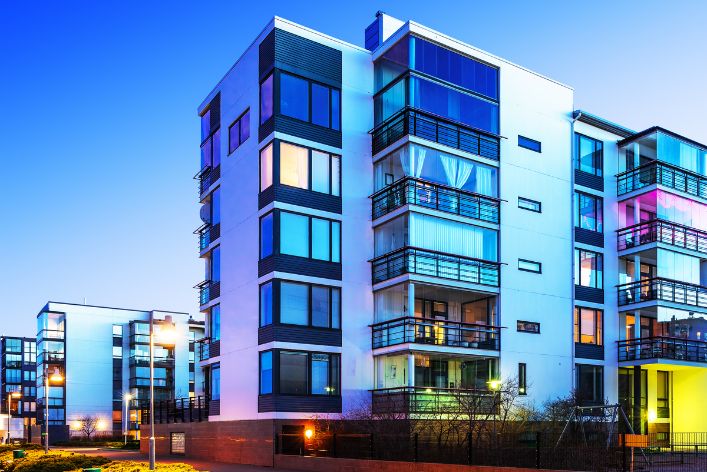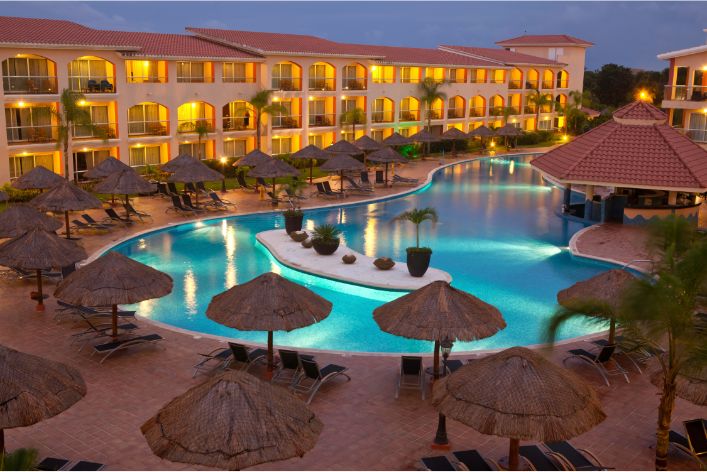Commercial real estate has been hit hard by the pandemic, with many properties left vacant and struggling to find tenants. At the same time, the hotel industry has seen a surge in demand as travel restrictions have eased. This presents a unique opportunity for property owners to repurpose their underutilized commercial real estate into hotels.

The purpose of this blog post is to explore the benefits of repurposing commercial real estate as hotels and provide guidance on how to make it happen. We believe that repurposing commercial real estate as hotels can not only bring new life to struggling properties but also provide much-needed accommodation options in areas where traditional hotels are in short supply.
The importance of repurposing commercial real estate as hotels is two-fold. First, it offers a new revenue stream for property owners who may be struggling to find tenants for their commercial real estate. Second, it provides a solution to the growing demand for hotel stays in areas where traditional hotels are either fully booked or non-existent.
By repurposing commercial real estate as hotels, property owners can take advantage of a changing business environment and diversify their offerings. It can also lead to cost savings and tax benefits, making it an attractive option for many. As we explore the topic further in this blog post, we hope to provide insights and strategies for those interested in pursuing this opportunity.
Reasons for Repurposing Commercial Real Estate as Hotels
Repurposing commercial real estate as hotels has become an increasingly popular trend in the hospitality industry. There are several reasons why property owners are considering this option. In this section, we will explore the top five reasons for repurposing commercial real estate as hotels.
A. Changing Business Environment
The pandemic has had a significant impact on the commercial real estate market. With many businesses shutting down or moving to remote work, there is a surplus of office and retail space available. As a result, property owners are looking for new ways to generate revenue from their underutilized spaces. Repurposing commercial real estate as hotels provides a solution to this problem.
B. Popularity of Hotel Stays
The popularity of hotel stays has continued to grow in recent years. Business and leisure travelers alike are looking for unique and affordable accommodation options. By repurposing commercial real estate as hotels, property owners can tap into this demand and offer a new type of lodging experience.
C. Diversification of Hotel Offerings
The hotel industry is becoming increasingly competitive. By repurposing commercial real estate as hotels, property owners can diversify their offerings and stand out from the competition. For example, a historic building that has been repurposed as a boutique hotel may attract a different type of guest than a traditional chain hotel.
D. Cost Savings for Owners
Repurposing commercial real estate as hotels can lead to cost savings for property owners. For example, if a property owner is struggling to find tenants for their office building, they may be spending money on maintenance and upkeep without generating any income. By repurposing the building as a hotel, they can start generating revenue and recoup their expenses.
E. Tax Benefits
There are also tax benefits to repurposing commercial real estate as hotels. Property owners may be able to take advantage of tax credits and incentives for renovating historic buildings or investing in low-income communities. Additionally, hotels are subject to a different tax rate than commercial real estate, which may be more favorable for property owners.
In summary, the top five reasons for repurposing commercial real estate as hotels are the changing business environment, the popularity of hotel stays, the diversification of hotel offerings, cost savings for owners, and tax benefits. By understanding these reasons, property owners can make informed decisions about whether repurposing their commercial real estate as a hotel is the right choice for them. In the next section, we will explore examples of successful repurposing of commercial real estate as hotels.
Read: Hotel Conversions: Turning Offices into Havens
Examples of Successful Repurposing of Commercial Real Estate as Hotels
Repurposing commercial real estate as hotels has become a popular trend in recent years. Property owners are finding creative ways to transform their underutilized spaces into unique and profitable hotels. In this section, we will explore examples of successful repurposing of commercial real estate as hotels across different types of buildings.
A. Historic Buildings
Historic buildings are a popular choice for repurposing as hotels. These buildings often have unique architectural features and a rich history that can be incorporated into the design of the hotel. The Detroit Foundation Hotel is a great example of a successful repurposing of a historic building. The hotel was once a fire department headquarters and has been transformed into a chic and modern hotel that pays homage to its historic roots.
B. Office Buildings
Office buildings are another type of commercial real estate that can be repurposed as hotels. These buildings often have large, open spaces that can be easily converted into guest rooms and common areas. The Arlo NoMad Hotel in New York City is a great example of a successful repurposing of an office building. The hotel features 250 guest rooms and several unique amenities, including a rooftop bar and a speakeasy-style lounge.
C. Retail Spaces
Retail spaces are also being repurposed as hotels. These buildings often have large storefronts and open floor plans that can be easily converted into hotel lobbies and common areas. The Source Hotel in Denver, Colorado is a great example of a successful repurposing of a retail space. The hotel is located in a former iron foundry and features 100 guest rooms, several restaurants, and a rooftop pool and bar.
D. Industrial Buildings
Industrial buildings are another type of commercial real estate that can be repurposed as hotels. These buildings often have large, open spaces and high ceilings that can be transformed into unique guest rooms and common areas. The Ace Hotel in Chicago is a great example of a successful repurposing of an industrial building. The hotel is located in a former cheese factory and features 159 guest rooms, several restaurants, and a rooftop bar.
In review, there are many successful examples of repurposing commercial real estate as hotels across different types of buildings. From historic buildings to retail spaces, property owners are finding creative ways to transform their underutilized spaces into profitable hotels. In the next section, we will explore the challenges of repurposing commercial real estate as hotels and provide strategies for overcoming these challenges.
Challenges of Repurposing Commercial Real Estate as Hotels
While repurposing commercial real estate as hotels can be a profitable venture, there are also several challenges that property owners may face. In this section, we will explore the top four challenges of repurposing commercial real estate as hotels and provide strategies for overcoming these challenges.
A. Zoning Regulations
One of the biggest challenges of repurposing commercial real estate as hotels is navigating zoning regulations. Depending on the location of the property, there may be specific zoning requirements for hotels that must be met. Property owners should research these requirements and work with local government officials to ensure compliance.
B. Building Code Requirements
Another challenge of repurposing commercial real estate as hotels is meeting building code requirements. Hotels have different safety and accessibility requirements than other types of commercial real estate, such as office buildings or retail spaces. Property owners should work with architects and contractors who are familiar with hotel building codes to ensure compliance.
C. Financing and Capital
Repurposing commercial real estate as hotels can also be challenging from a financial standpoint. Converting a building into a hotel can be expensive, and property owners may need to secure financing or find investors to cover the costs. Additionally, hotels require ongoing maintenance and staffing, which can be costly. Property owners should have a solid financial plan in place before embarking on a repurposing project.
D. Competition
Finally, property owners may face competition when repurposing commercial real estate as hotels. The hotel industry is becoming increasingly competitive, and property owners need to ensure that their hotel stands out from the competition. This may involve offering unique amenities, targeting a specific niche market, or providing exceptional customer service.
Overall, repurposing commercial real estate as hotels comes with its own set of challenges. However, by understanding and planning for these challenges, property owners can overcome them and create successful hotels. In the next section, we will explore strategies for repurposing commercial real estate as hotels.
Here is a list of amazing blog posts you should read:
- Real Estate Vs Urban Planning
- How to Make Money from Real Estate
- How Real Estate Investing Works
- How Can Software Technology Aid Real Estate?
- Maximizing Your Home’s Value: Top Renovations to Consider
- Ways to Finance Your First Investment Property
- How to Invest in Real Estate without Buying Property
- Investing in Beachfront Hotels: What to Know
Strategies for Repurposing Commercial Real Estate as Hotels
Repurposing commercial real estate as hotels can be a complex process that requires careful planning and execution. In this section, we will explore four strategies for repurposing commercial real estate as hotels.
A. Conducting a Feasibility Study
Before embarking on a repurposing project, property owners should conduct a feasibility study to determine if the project is viable. The study should include a market analysis to determine if there is demand for a hotel in the area, an assessment of the property’s current condition, and a cost analysis to determine if the project is financially feasible. The results of the feasibility study can help property owners make informed decisions about whether to move forward with the project.
B. Working with Local Government
Working with local government officials is an important strategy for repurposing commercial real estate as hotels. Property owners should research zoning regulations and building codes and work with government officials to ensure compliance. Additionally, property owners should explore any incentives or tax credits that may be available for repurposing commercial real estate as hotels.
C. Utilizing Incentives
There are several incentives available to property owners who repurpose commercial real estate as hotels. For example, there may be tax credits or grants available for renovating historic buildings or investing in low-income communities. Property owners should research these incentives and work with local government officials to take advantage of them.
D. Partnering with Hotel Management Companies
Finally, property owners may want to consider partnering with hotel management companies to operate their new hotel. Hotel management companies have experience in operating hotels and can provide valuable expertise in areas such as marketing, staffing, and revenue management. Additionally, partnering with a hotel management company can help property owners ensure that their hotel is competitive and successful in the marketplace.
All in all, there are several strategies that property owners can use to successfully repurpose commercial real estate as hotels. By conducting a feasibility study, working with local government officials, utilizing incentives, and partnering with hotel management companies, property owners can create profitable and successful hotels. In the next section, we will explore the benefits of repurposing commercial real estate as hotels.
Benefits of Repurposing Commercial Real Estate as Hotels
Repurposing commercial real estate as hotels has several benefits for property owners and the local community. In this section, we will explore the top five benefits of repurposing commercial real estate as hotels.
A. Increased Revenue
Repurposing commercial real estate as hotels can provide property owners with a new and profitable revenue stream. Hotels typically generate higher income than other types of commercial real estate, such as office or retail space. Additionally, hotels can generate revenue year-round, whereas other types of commercial real estate may have seasonal demand.
B. Job Creation
Repurposing commercial real estate as hotels can also create new jobs in the local community. Hotels require staff for positions such as housekeeping, front desk, and management. By creating new jobs, property owners can contribute to the local economy and help reduce unemployment rates.
C. Revitalization of Underutilized Areas
Repurposing commercial real estate as hotels can revitalize underutilized areas in the community. By converting an unused building into a hotel, property owners can bring new life to the area and attract more visitors. This can lead to increased foot traffic and more business for local shops and restaurants.
Put Your Tech Company on the Map!
Get featured on Nicholas Idoko’s Blog for just $50. Showcase your business, boost credibility, and reach a growing audience eager for tech solutions.
Publish NowD. Preservation of Historic Buildings
Repurposing historic buildings as hotels can help preserve the history and character of the community. Instead of tearing down a historic building, property owners can transform it into a unique and charming hotel that celebrates the building’s past. This can also attract visitors who are interested in the history and culture of the area.
E. Meeting the Growing Demand for Hotels
Finally, repurposing commercial real estate as hotels can help meet the growing demand for hotel stays. With travel becoming more accessible and affordable, the demand for hotels is increasing. By repurposing commercial real estate as hotels, property owners can provide additional lodging options in areas where traditional hotels may be fully booked or non-existent.
Lastly, repurposing commercial real estate as hotels has several benefits for property owners and the local community. By generating increased revenue, creating new jobs, revitalizing underutilized areas, preserving historic buildings, and meeting the growing demand for hotels, property owners can create successful and profitable hotels. In the next section, we will provide a conclusion to this blog post.
Conclusion
On a final note, repurposing commercial real estate as hotels is a trend that is gaining momentum in the hospitality industry. By converting underutilized commercial real estate into hotels, property owners can generate increased revenue, create new jobs, revitalize underutilized areas, preserve historic buildings, and meet the growing demand for hotels.
We explored the challenges of repurposing commercial real estate as hotels, including zoning regulations, building code requirements, financing and capital, and competition. However, with careful planning and execution, these challenges can be overcome.
We also provided strategies for successfully repurposing commercial real estate as hotels, including conducting a feasibility study, working with local government officials, utilizing incentives, and partnering with hotel management companies.
We encourage property owners to consider repurposing their commercial real estate as hotels, especially in areas where traditional hotels are in short supply. This can provide a unique and profitable opportunity to diversify their offerings and tap into the growing demand for hotel stays.
Finally, we believe that the future of the hotel industry is bright. As travel becomes more accessible and affordable, the demand for hotels will continue to increase. Repurposing commercial real estate as hotels can provide a solution to this demand while also revitalizing underutilized areas and preserving historic buildings. We encourage property owners to explore this option and contribute to the growth of the hotel industry.
Before You Go…
Hey, thank you for reading this blog to the end. I hope it was helpful. Let me tell you a little bit about Nicholas Idoko Technologies. We help businesses and companies build an online presence by developing web, mobile, desktop, and blockchain applications.
We also help aspiring software developers and programmers learn the skills they need to have a successful career. Take your first step to becoming a programming boss by joining our Learn To Code academy today!
Be sure to contact us if you need more information or have any questions! We are readily available.
[E-Books for Sale]
1,500 AI Applications for Next-Level Growth: Unleash the Potential for Wealth and Innovation
$5.38 • 1,500 AI Applications • 228 pages
Are you ready to tap into the power of Artificial Intelligence without the tech jargon and endless guesswork? This definitive e-book unlocks 1,500 real-world AI strategies that can help you.
See All 1,500 AI Applications of this E-Book
750 Lucrative Business Ideas: Your Ultimate Guide to Thriving in the U.S. Market
$49 • 750 Business Ideas • 109 pages
Unlock 750 profitable business ideas to transform your future. Discover the ultimate guide for aspiring entrepreneurs today!
See All 750 Business Ideas of this E-Book
500 Cutting-Edge Tech Startup Ideas for 2024 & 2025: Innovate, Create, Dominate
$19.99 • 500 Tech Startup Ideas • 62 pages
You will get inspired with 500 innovative tech startup ideas for 2024 and 2025, complete with concise descriptions to help you kickstart your entrepreneurial journey in AI, Blockchain, IoT, Fintech, and AR/VR.
We Design & Develop Websites, Android & iOS Apps
Looking to transform your digital presence? We specialize in creating stunning websites and powerful mobile apps for Android and iOS. Let us bring your vision to life with innovative, tailored solutions!
Get Started Today



